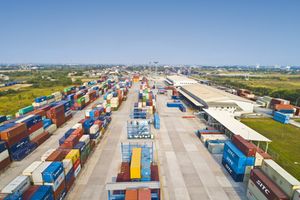WaterAid Tanzania: WASH services in healthcare improve people’s health and wellbeing

Hand hygiene is a critical WASH component for primary disease emergence and anti-microbial resilience control which are reported to cause higher death tolls in low-disposable income countries.
What you need to know:
- Using the strong financial moguls such as Global Fund, Gavi, and the World Bank can significantly facilitate excessive funding for WASH.
Ahead of the anxiously-awaited Summit on Future that will be held on 22-23 September 2024, UN member countries pledged their renewed commitment to attain the goals set at the High-Level Political Forum (HLPF) in New York on 8-18 July, 2024.
“We must continue seeking solutions to advance the implementation and achievement of the Sustainable Development Goals,” said Ms Paula Narváez, President of the UN Economic and Social Council.
As far as WASH related services are concerned with the fresh commitment to fast-track the SDGs, WaterAid Tanzania (WAT) is not spared by the calling.
Steadily, 40 years of commitment to WASH issues couldn’t go down the drain for WaterAid like that. The company has devised a five-year strategy (2023-2028) which is impeccably aligned with the SDG goal 6 that seeks to achieve the goal of water, sanitation and hygiene for all.
Generally, numbers are stacked in favour of WaterAid Tanzania during that period. Notably 1.8 million people have been lifted to access clean and safe water, 800,000 households have been provided with decent toilets and 26 million individuals have promoted hygienic practices.
WASH as driver for people’s health and well-being Again, to ‘turbo-charge’ its mission of addressing the health and wellbeing of the people as WASH champion, which is an essential docket for WaterAid Tanzania now, it has their strategies perfectly aligned with the national and global goals, – one of them being to prioritize WASH across the health sector to improve public health.
Through combining the five-year Strategy and the WSDP (III) Programme, the company has managed to set up proper WASH service systems in 35 healthcare facilities to only facilitate better health services with dignity.
This goes hand in hand with the move on supplying handwashing facilities in public areas to improve hand hygiene. That being done, healthcare facilities now have water supply, sanitation and are hygienic.
And 8.5 million people were reached with clean water, sanitation and hygiene services. This doesn’t and shouldn’t end there.
WaterAid Tanzania plays a pivotal role in advocating stronger links between SDG 3 and SDG 6 by demonstrating the direct impact that adequate WASH services in HCFs have on improving health.

A healthcare provider checks on a baby carried by her mother. It is revealed that access to WASH services prevents probable maternal and neonatal deaths.
As a country, adding the SDG 6 into the summit conversation is equally significant when it’s foundational to achieving SDG 3, as WASH is critical for preventing the spread of diseases, improving maternal and newborn health, and ensuring the safety and dignity of patients and healthcare workers in healthcare facilities (HCFs).
WASH as anti-AMR secret weapon
The coveted High-level Meeting policy brief highlighted, among other issues, antimicrobial resistance (AMR) as one of the most urgent global health threats and development challenges and demands immediate action.
WASH can be leveraged as an anti-AMR weapon to trust. More than 750,000 deaths each year from microbial diseases in low and middle income countries could be prevented in low-and middle-income countries alone could be prevented only if control measures and infection prevention are improved.
In this case, the provision of safe WASH services is fundamental for preventing the emergence, re-emergence and spread of microbial bacteria, while noting with concern that 22 per cent of the world’s health-care facilities lack basic water services and at least half lack basic hygiene services.
“The integration of WASH services in our healthcare facilities is not just an option; it is an imperative. It is a foundation upon which we can build a healthier, more resilient Tanzania.
“By prioritizing WASH, we will safeguard maternal health, enhance public health, and combat the growing threat of antimicrobial resistance,” said Hon Dr Hamis Kigwangala (MP), The Chairperson of the Tanzania Parliamentarian Alliance for Antimicrobial Resistance.
Financing needs
Provided the emerging budget gaps face the least developed countries in in strengthening WASH-based capacities of healthcare facilities, there is a specific commitment to increase international cooperation and financing, including the mobilization of financial resources through bilateral and multilateral channels.
“We need Health and Water ministries and donors to meet the attainment of the budget commitment in the Water Sector Development Programme (WSDP-- III) of USD 49 million that aimed to deliver WASH in HCFs by 2026,” said Ms Christina Mhando, Head of Policy, Advocacy and Influencing of WaterAid Tanzania.
Using the strong financial moguls such as Global Fund, Gavi, and the World Bank can significantly facilitate excessive funding for WASH. But above-named options shouldn’t stand as a lullaby to send countries like Tanzania with immediate financing demands to sleep and forget to maintain or raise sustainable financing channels at national, regional, and global levels to strengthen their capacities for WASH, surveillance, and response.
“WASH services must be given priority if we are to end the disease cycle. Decent toilets, clean water, and hand hygiene can stop infections before they start, which lowers the need for antibiotics and mitigating the development of resistance. This is a matter of National and Global security, not just healthcare,” said Ms Anna Mzinga, Country Director of WaterAid, Tanzania.


